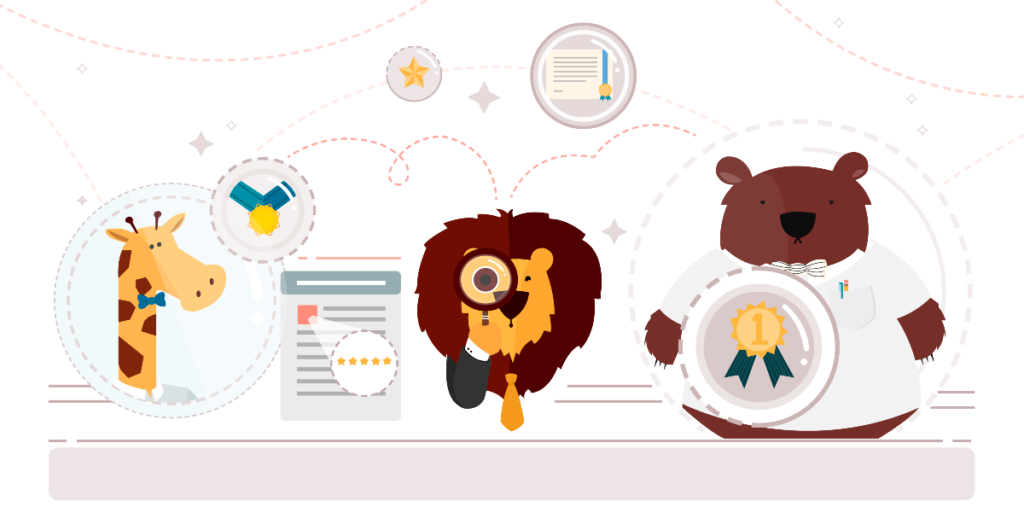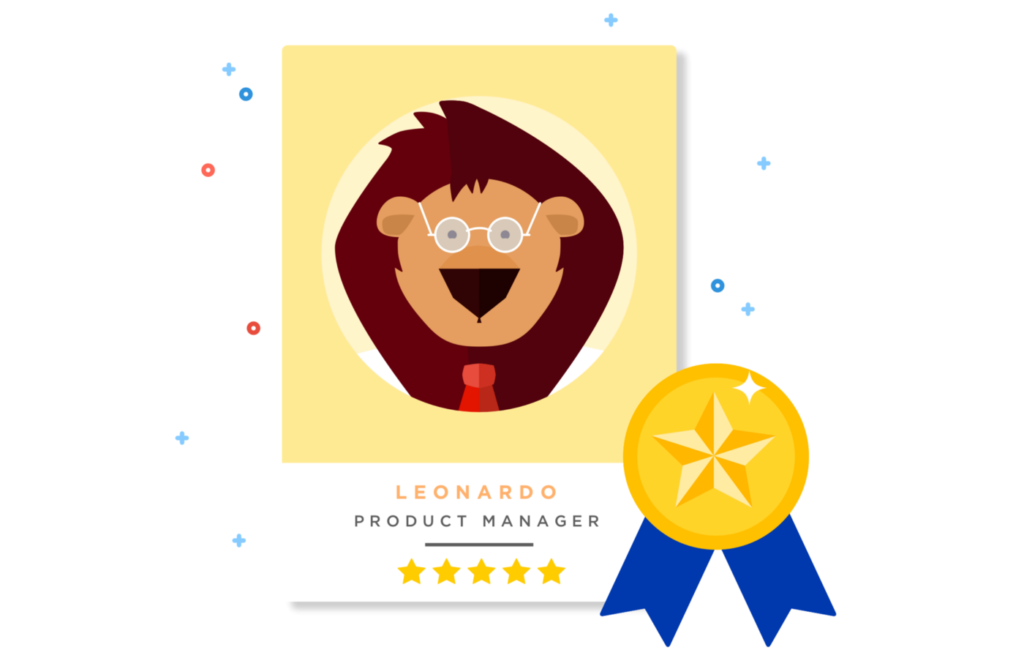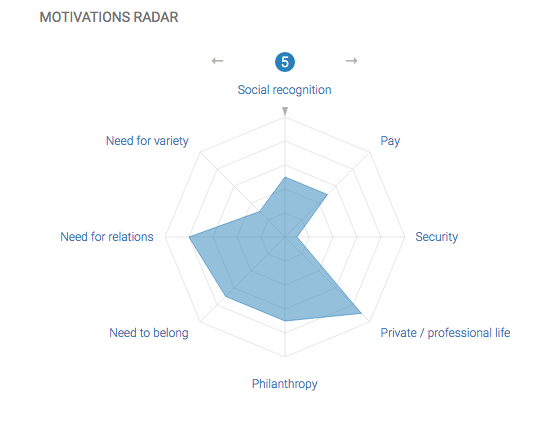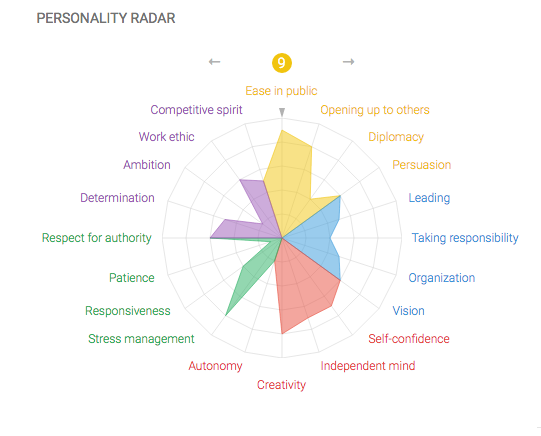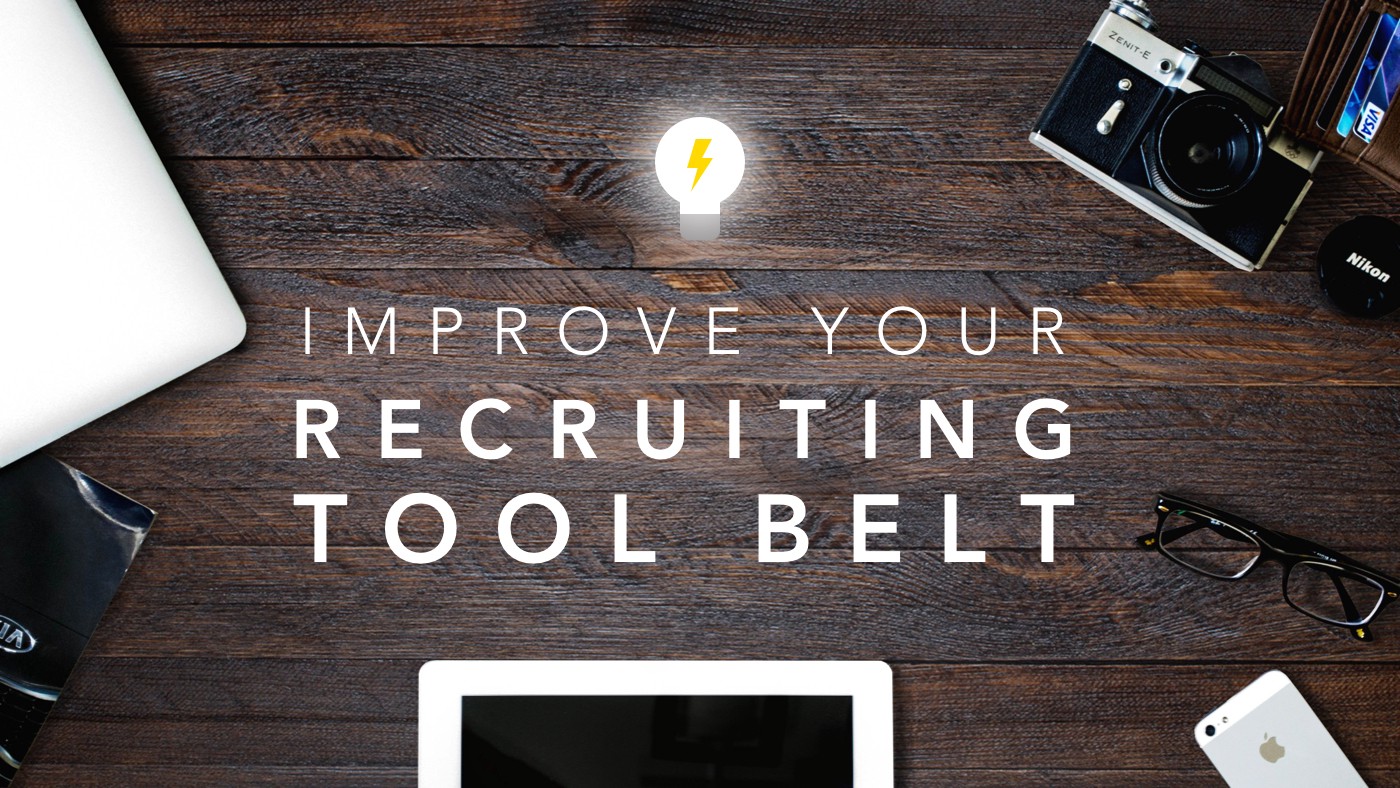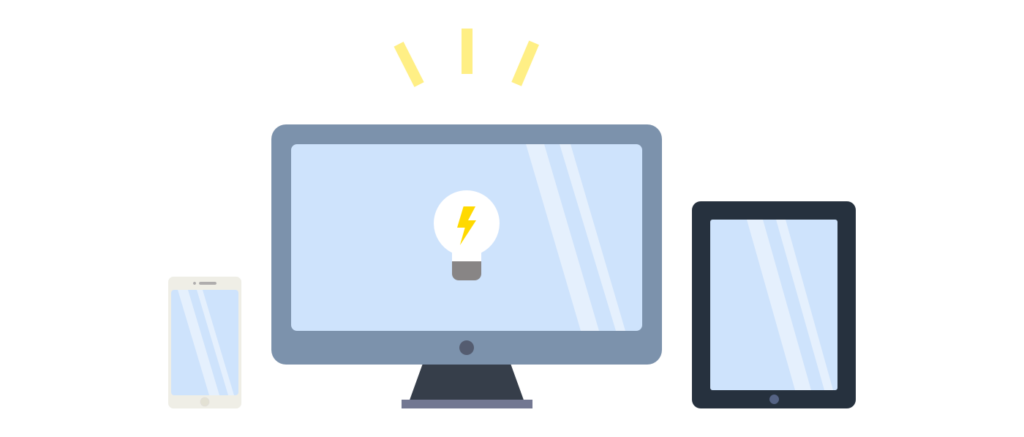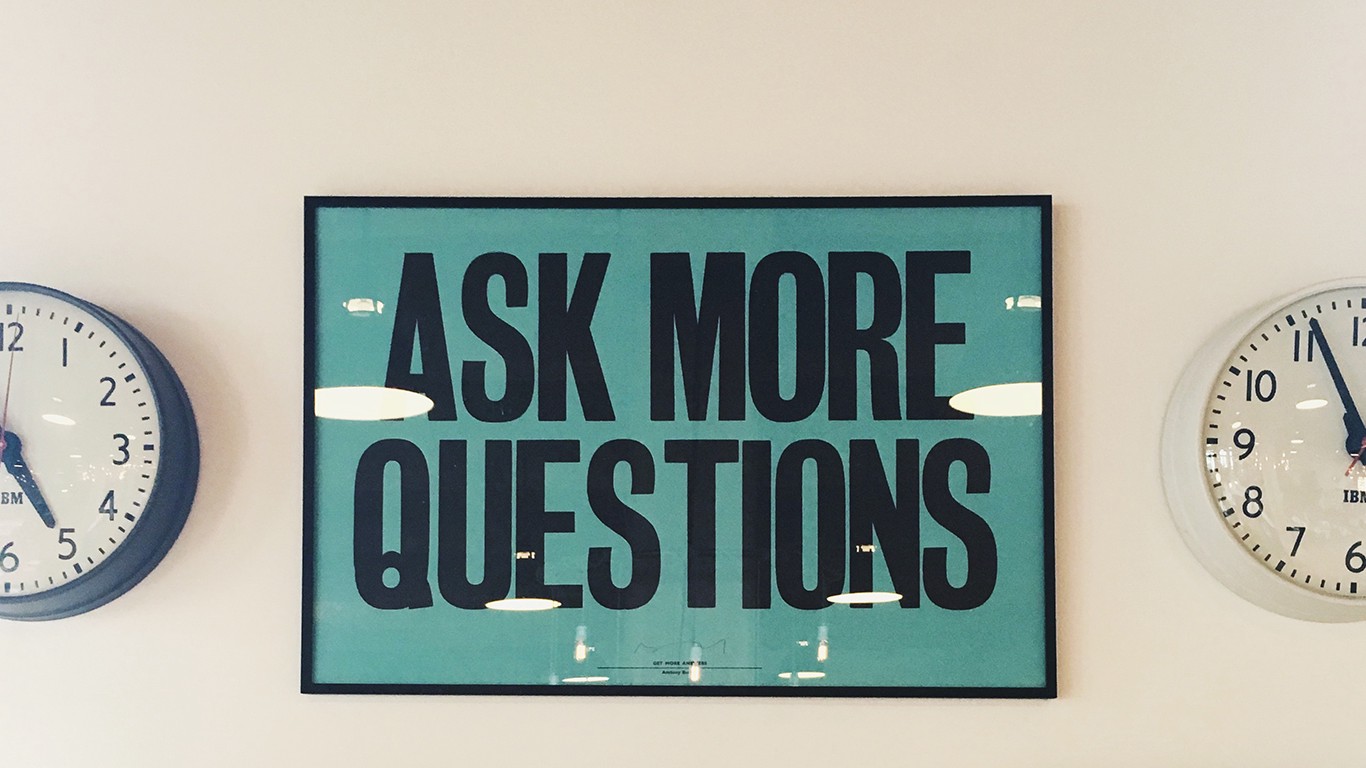Magical Beasts and how to hire them.

Hiring for your start up? Become a hiring wizard with this free webinar and these recruiting tips.
If you are an entrepreneur you want nothing short of mystical candidates. Individuals that make something out of nothing and can conjure a lead out of thin air. Whether your company has been around for one month or one hundred years, when you’re expanding into a new market, you have to hire with a start-up mentality. Hiring is an incredible opportunity, but it’s also a risk. As a start-up, you have fewer resources, so if a new hire doesn’t work out, it causes significant burden to the rest of the team. And if you’re managing a new team from a distance, the stakes are even higher. No pressure, but who you hire can make or break your start-up’s success!
If you want to learn all the ins and outs of recruiting for small companies and large companies alike tune into our free webinar on December 14th. Not only will you leave with valuable knowledge on how to assess your candidates soft skills & hard skills but we will also delve into the interview process and how to detect what is beyond the curtain. A professional recruiter give you her insights and you will leave with the tools to play psychologist and truly choose a candidate for the long haul.
But wait there is more..
In the mean time, lets discuss the traits you should look for in a candidate so you can land the perfect person for your company.
Interviewing is obviously the biggest tool recruiters currently use to find the right fit for a team. Interviewing candidates is an art, both from the interviewer and the interviewee standpoints. Some candidates are great at selling themselves, others more reserved. It could be they grew up in a culture where self-promotion was considered a vice, not a virtue, and not indicative of how well they’d perform in a role. Some recruiters are better than others at bringing out the best in candidates in a conversation.
So how do you know if a candidate will fly or flounder in your company’s entrepreneurial culture? Look for these traits:
- Accountability: Determine how the candidate owns his or her work. Notice if he or she answers questions with “I” or “We”. It’s imperative in a start-up that employees take full responsibility for their roles, tasks and actions.
- Self-motivation: In a start-up you don’t have as much time for rah-rah speeches and trying to light a fire under your team. You need an employee who has an intrinsic desire to work hard and perform well.
- Flexibility: One day the goal might be sales, the next traffic. Mission statements and organization charts evolve quickly. To succeed in a start-up, one must be able to adapt to change.
- Skill/Education: Certainly, having the right skills and education for a role brings results. The closer a candidate matches the expertise you need the less time they’ll need to be trained.
- Passion: Believing in the mission of your company and having a passion for the work you’re doing is key for start-up company employees. It’s what will keep them going in the middle of the night before a big launch.
- Resourceful: An ideal start-up employee knows how to solve problems, often with little resources. Like business Macgyvers, they can make big things happen with Excel and a couple of paper clips.
You don’t have to rely on hours of subjective interviews to figure out if your candidate is “the one.” Identifying a candidate’s personality traits objectively can be done using a people analytics tool like the Talentoday Manager. Here’s an example profile of a real person who is currently successful at a start-up. As you can see, with one glance you can identify areas of strength to match the profile you need.
Talentoday further identifies her as a great start-up candidate with these insights:
Creativity 8 / 10: She likes to be innovative and find original solutions. She is not very conventional.
Stress Management 8 / 10: She finds it easy to keep her cool in stressful situations. She performs well under pressure.
Motivations — Security 1 / 10: She does not need security in her work; she likes to take risks.
Motivation — Need for Relations 9 / 10: She is motivated by teamwork and relations with others are very important.
The most important asset a start-up has is its people. When reviewing your candidates, identifying their personality traits is even more important than evaluating their skills. With the right personality traits, an employee can gain experience and move up the ladder, developing into exactly the long-term magical beast you always dreamed of.
Curious to find out if your candidates have what it takes? Start your free trial today and test your candidate quickly & effectively for free!
Let’s face it, recruiting can be difficult. Let us help.
Join our free webinar to get in on the secrets of hiring for your start up
Do you Really Know Who You’re Interviewing?

A job interview can go anywhere from 15 minutes, if it’s not going well, to about an hour, if it’s going great! But is this polished, poised, prepared-to-impress you candidate the same person you’d see on a day-to-day basis? Interviewing is an art, and the decision to hire often is dependent on the interviewer’s instinct. “Unfortunately most research shows that you can only trust your gut when it comes to hiring about 50 percent of the time,” says Beverly D. Flaxington, author of Understanding Other People: The Five Secrets to Human Behavior in this ZipRecruiter article. “And a bad hire is costly and disruptive.”
There are ways to increase the odds that your instinct about a candidate is right and avoid costly bad hires. One way is to use a screening company like HireArt — they conduct the first round of video interviews over Skype for you. Another is to partner with a candidate matching service liked Hired.com, where your job openings get matched with resumes in their database. While that’s a very handy tool for matching skill and experience, it’s still only part of what will make an employee last long term. To truly understand whom you’re interviewing you need to introduce objective, personality assessment data into your evaluation. By giving candidates a 15-minute quiz using Talentoday, you’ll have:
- Unique insights you won’t get in an interview. The results will give you a clear understanding of what motivates and drives your candidate, as well as show you their predictive behaviors in seven key areas: teamwork, ability to take initiative, management style, ability to handle pressure, reasoning style, communication style, and flexibility. You’ll see how well a candidate works under pressure, and even what areas in which a candidate could improve.
- Candidate vs. Candidate comparisons. You’ll be able to see how your prospective hire ranks in personality, motivations and soft skills compared to others in your industry. There could be similarities and differences that will help you identify the kind of person you’re looking for.
- Candidate vs. Company comparison. Since Talentoday urges you to assess your team to get a sense of what you are looking for, it will be easy to see how or if your potential hire aligns. You can also widen the scope and see how the candidate fits within the culture of the whole company.
Here’s an example of Jennie, a real candidate who took the Talentoday assessment.
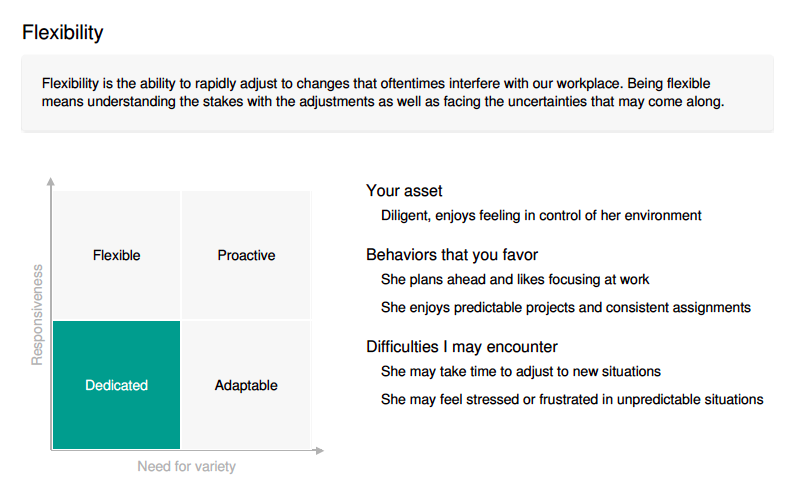
You can see that Jennie is a dedicated planner and thrives with a predictable structure. If the position you’re hiring doesn’t match that kind of environment, it won’t matter if her experience and hard skill set is a match, she probably won’t be a happy, long-term employee.
With the insight and intelligence that Talentoday provides added to your interview process, you’ll be confident that you’re choosing the right employee for your team.
Want valuable insights on your top recruits ? Start your free trial today and use predictive analytics and psychology to make smart hiring decisions. And if you like this post, please hit the ❤️ button below or give me a shout on Twitter.
How to Build Team Effectiveness: Bringing Balance by Empowering Management
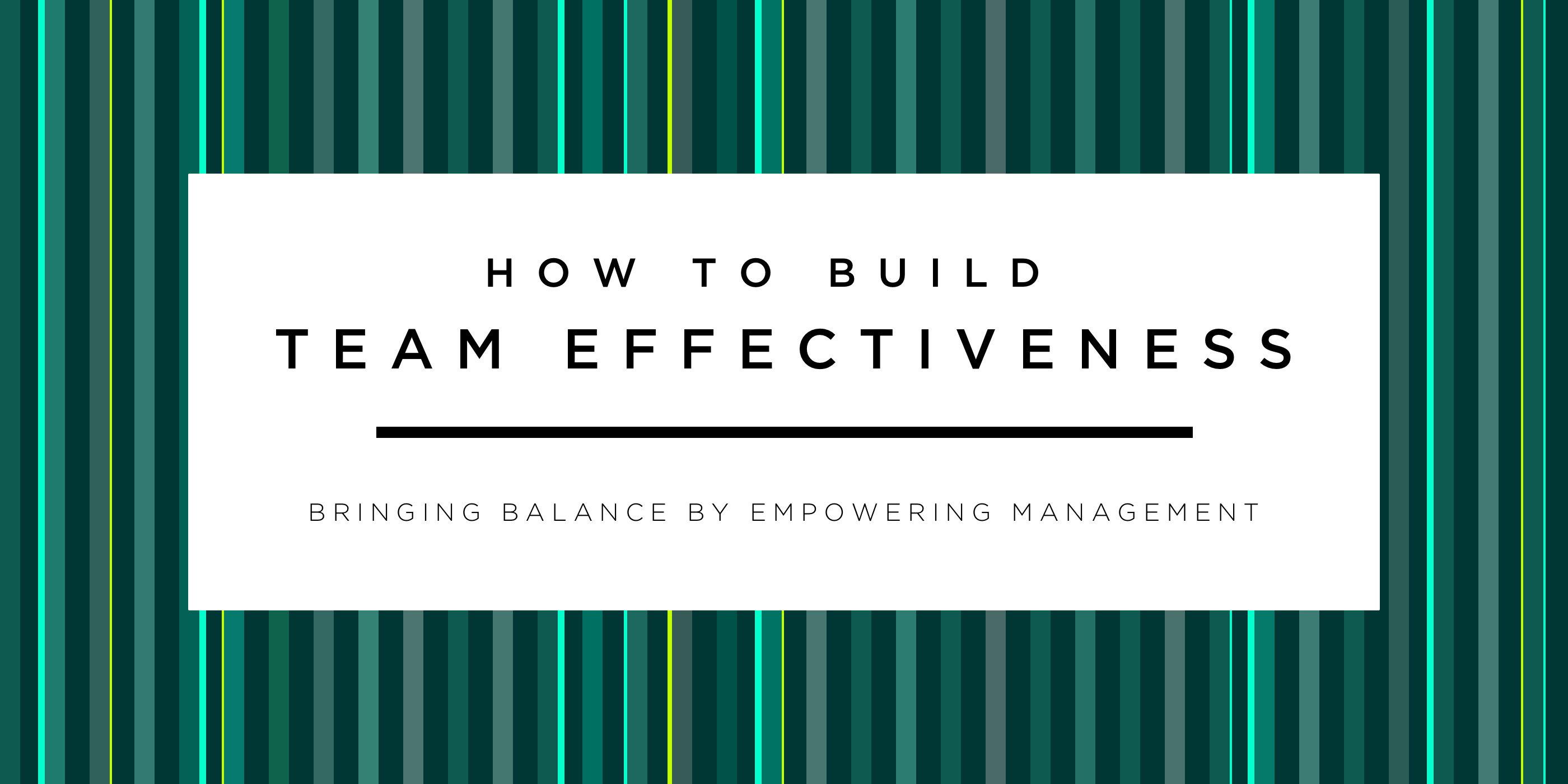
Last week I touched upon the importance of individual self-awareness for team effectiveness in Part 1 of this series, How to Build Team Effectiveness: It starts with the Individual. Today I will shift my attention to leadership within the team, and what managers should strive for when creating a balanced team.
I decided to interview a long-time successful leader, Gino Blefari, CEO of Berkshire Hathaway HomeServices. With 30 years of management experience under his belt and numerous awards in leadership and mentorship, I knew he would have a few nuggets on team effectiveness.
Gino first said that a key to his success in inspiring teams is that he is constantly learning. He is always picking up books and learning new techniques from authors new and old. The books he reads are not just business books, some are fictional novels, others autobiographies, all in which he is able to prune out important takeaways.
When I asked him what makes up a good team he got excited, telling me he had just read The Boys in the Boat, a feel-good story about superstar rowers on a quest to achieve Olympic victory. He said not only was the story incredibly inspirational, but weaved in the keys to a successful team that are applicable to every industry and profession.
“Crew races are not won by clones. They are won by crews, and great crews are carefully balanced blends of both physical abilities and personality types … And capitalizing on diversity is perhaps even more important when it comes to the characters of oarsmen. Good crews are good blends of personalities; someone to lead the charge, someone to hold something in reserve; someone to pick a fight, someone to make peace; someone to think things through, someone to charge ahead without thinking. Somehow all this must mesh. That’s the steepest challenge.”
It goes without saying that every team is different. What makes a team dynamic and productive is having variety. Building on the knowledge of an individual’s skill set, managers can harness their unique skills to build teams with balance. A smart manager knows what to look for but often has little time. Gino & I discussed that his busy schedule has pushed him to make every minute count.
As a manager, it is your job to create an environment that fosters this idea of synergy. Synergy is defined as the interaction or cooperation of two or more individuals to produce a combined effect greater than the sum of their separate effects. When I asked Gino how he achieves this with his teams, he was ready with an answer,
“The closer the team is together, the better the team will perform together. When individuals become accountable to their teammates, that’s when productivity grows exponentially.”
Every time someone new joins his team they are assigned an accountability partner. You are responsible for talking to your partner every day, whether it is a call or an in person meeting. The goal of the call is to get to know your teammate as an individual, aside from work. In a dream world this would happen with every new hire across all companies. But time and expansion can cause managers to cut corners when getting to know their teammates, throwing a wrench in that whole “synergy” thing.
So how can we stay in tune with our employees changing needs especially when we are pressed for time? One option might rely on technology. For instance, Talentoday, a people analytics platform and soft skills personality assessment, allows a manager to become the psychologist who can artfully concoct the perfect blend of personalities to create an effective team.
Similar to Gino’s “accountability partner” idea, Talentoday’s Premium Development Report allows you get an in depth analysis of an individual’s personality traits and motivators in the work place. Everyone is unique and we all have different drives that get us out of bed in the morning. As a manager, having these insights in your back pocket would no doubt give you the information you need to keep your employees engaged.
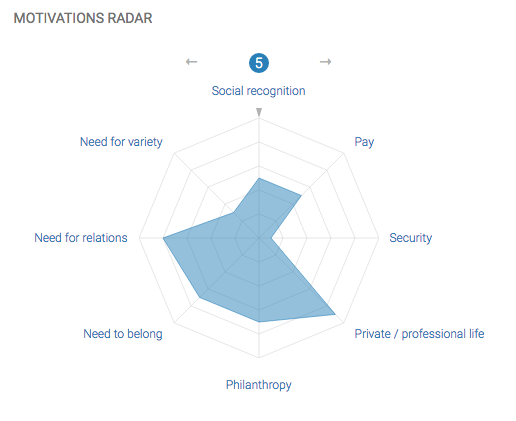
But this idea of getting to know your employee both personally and professionally only works if you have hired the right individual in the first place. Which brings me to my final thought; fostering team effectiveness begins with recruiting the right people. Next week we will take a look at the recruiting process and the important combination of data and intuition when selecting people to join your team.
Curious to find out your professional traits? Check out our page to take your free personality assessment today. And if you like this post, please hit the ❤️ button below or give me a shout on Twitter.
HR Managers are Redefining Merit to Justify Discrimination

Studies show that gender and culturally diverse companies are more successful. This report from McKinsey found that businesses that are gender diverse are 15% more likely to financially outperform homogenous companies, and businesses that are ethnically diverse are 35% more likely to outperform less diverse ones.
Yet, according to this study by Yale researchers, decision makers may downplay the importance of a female applicant’s areas of expertise and inflate the importance of her areas of weakness. Alternatively, decision makers may view the credentials of a specific male applicant as essential to job success and view his areas of weakness as nonessential.
Many companies are trying to improve diversity, or at least claiming they are. Earlier this year, Airbnb announced they assembled a team of civil rights leaders (including the former Attorney General Eric Holder) to review and update the company’s anti-discrimination policies. “I want us to be smart and innovative and to create new tools to prevent discrimination and bias that can be shared…” said co-founder Brian Chesky in this blog post.
Blogger Erica Jones candidly discussed her own experience being the sole black woman on various IT teams, encountering racial bias’ both blatant (degrading comments by coworkers) and clandestine (the company hiring out on a project Jones was the most qualified to do). Jones said,
“I am a black woman who happens to work in the tech industry. I don’t need to change to fit within my industry. My industry needs to change to make everyone feel included and accepted.”
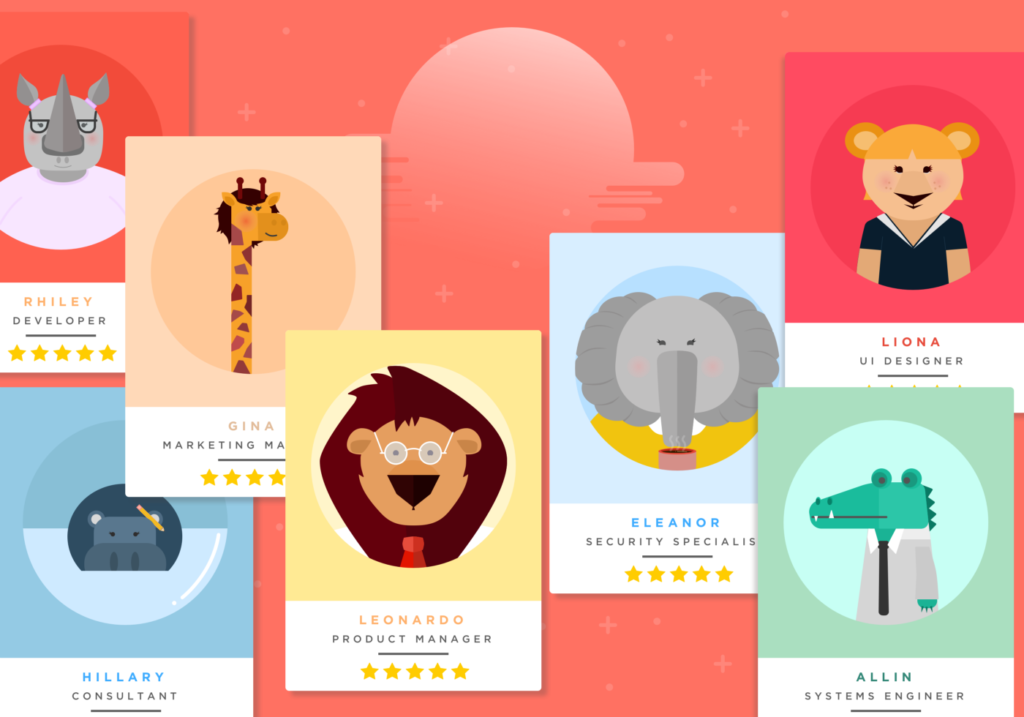
Some companies are making progress on gender diversity. Fortune recently reported that food-delivery company Grubhub has seen success with 50% of its executives being women, 43% of its workforce, and 23% of its engineers (10% more than U.S. average).
Recruiting talent from a larger pool of backgrounds lends itself to a more balanced team. One can see how, in this analysis by Talentoday who reviewed real personality comparisons by country:
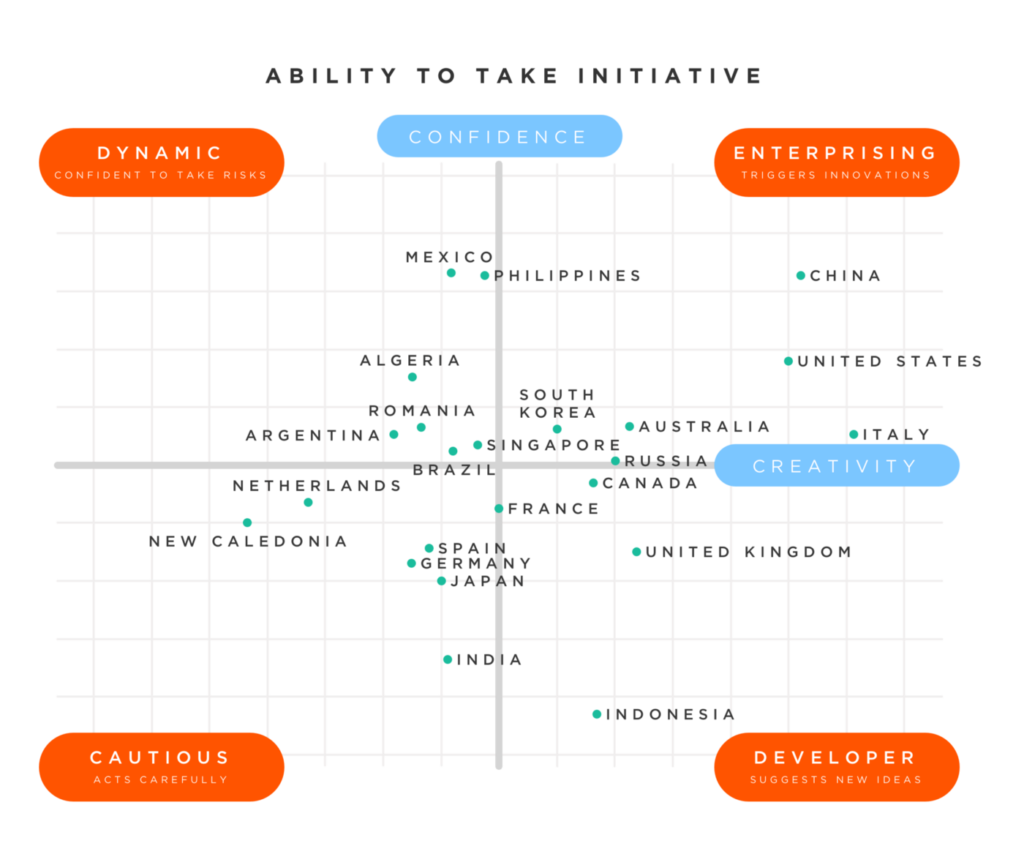
Having a team of dynamic, cautious, enterprising and developer mindsets is ideal — for balanced idea generation and execution. The enterprising person inspires the developer, the dynamic person’s boldness is balanced by the cautious. As the graph above shows, if one only hires people from the U.S. it can be harder to obtain such a diverse team.
Avoiding discrimination bias and fostering a culturally and gender diverse team begins with the hiring manager. Companies who try to do diversity well often make the mistake of casting a wide net initially, but bias’ show up in the final selection. Hiring managers shouldn’t focus on people that are most similar to him or her, but rather aim for as wide of a range of a group as possible. The real problem lies in the bias of the final selection from recruiters and hiring managers.
Disrupting the Bias
One way managers can minimize their bias may be by evaluating the skills of candidates using a personality assessment tool. This gives managers and recruiters an objective way to look at a persons soft skills to create a team that works best together.
But not all tools are created equal. As Nanette Byrnes wrote in this piece on Technology Review,
“the danger remains that unrecognized bias, just in the programming of an algorithm but even in the data flowing into it, could inadvertently turn any program into a discriminator.”
Algorithms must be specifically tailored to minimize the bias, like objective data found in the Talentoday manager that helps reduce the bias of decision makers. Talentoday takes a look at the motivations and personality traits needed to succeed at a given job. Managers can assess their candidates and match the personality results to the industry standard to find the right fit, scientifically.
Another company has taken a different approach. GapJumpers has reworked the hiring process to include blind interviews modeled after the hit TV series The Voice. Cofounder and CEO, Kedar Iyer, states,
“If one industry, especially a shallow one like the music industry, can do [blind auditions], why can’t tech companies, which are so much more scientific, do them?”
GapJumpers found that male applicants raised concerns about having to prove themselves in a blind test more often than women. Once the blind challenge was completed, the gender breakdown of those candidates hired was 58% women, 42% men.
At the end of the day, in order to interrupt the process of judgment the focus must be shifted to evidence and away from perception. We may be a long way from changing human conditioning but companies can adapt with tools to make the hiring playing field less biased.
Check out our page to send our free personality assessment to your potential new hires today. And if you like this post, please hit the ❤️ button below or give me a shout on Twitter.
6 Qualities Every Start-Up Employee Should Have
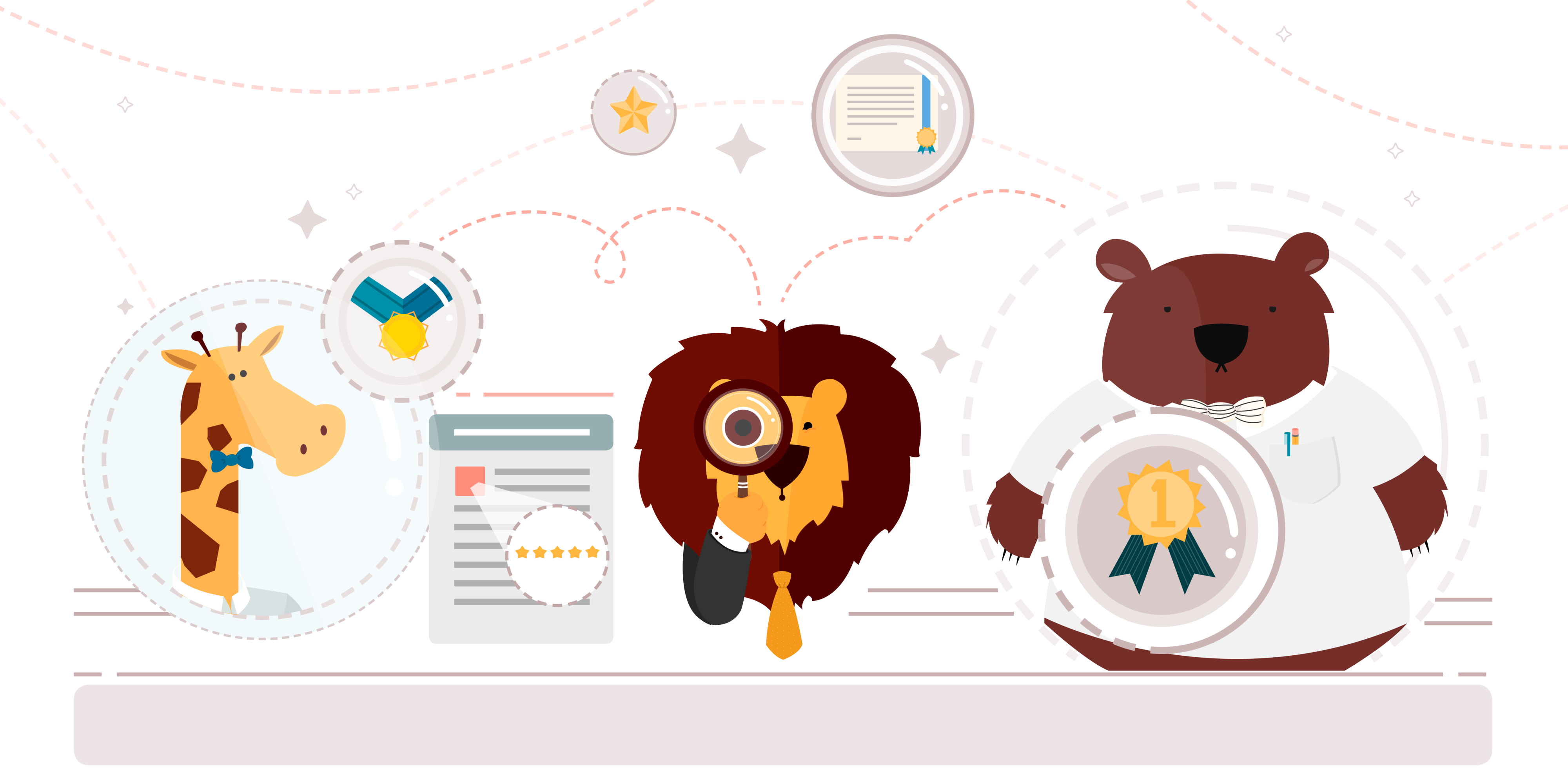
Is your start up hiring? Make sure you do your homework.
Whether your company has been around for one month or one hundred years, when you’re expanding into a new market, you have to hire with a start-up mentality. Hiring is an incredible opportunity, but it’s also a risk. As a start-up, you have fewer resources, so if a new hire doesn’t work out, it causes significant burden to the rest of the team. And if you’re managing a new team from a distance, the stakes are even higher. No pressure, but who you hire can make or break your start-up’s success!
Start-ups have a unique dynamic, and not everyone is well suited for it. It might be enticing to hire a seasoned professional from a big name company, but be careful. They may experience culture shock when they don’t have as many resources or a large team to take care of tasks for them.
Interviewing is obviously the biggest tool recruiters currently use to find the right fit for a team. Interviewing candidates is an art, both from the interviewer and the interviewee standpoints. Some candidates are great at selling themselves, others more reserved. It could be they grew up in a culture where self-promotion was considered a vice, not a virtue, and not indicative of how well they’d perform in a role. Some recruiters are better than others at bringing out the best in candidates in a conversation.
So how do you know if a candidate will fly or flounder in your company’s entrepreneurial culture? Look for these traits:
- Accountability: Determine how the candidate owns his or her work. Notice if he or she answers questions with “I” or “We”. It’s imperative in a start-up that employees take full responsibility for their roles, tasks and actions.
- Self-motivation: In a start-up you don’t have as much time for rah-rah speeches and trying to light a fire under your team. You need an employee who has an intrinsic desire to work hard and perform well.
- Flexibility: One day the goal might be sales, the next traffic. Mission statements and organization charts evolve quickly. To succeed in a start-up, one must be able to adapt to change.
- Skill/Education: Certainly, having the right skills and education for a role brings results. The closer a candidate matches the expertise you need the less time they’ll need to be trained.
- Passion: Believing in the mission of your company and having a passion for the work you’re doing is key for start-up company employees. It’s what will keep them going in the middle of the night before a big launch.
- Resourceful: An ideal start-up employee knows how to solve problems, often with little resources. Like business Macgyvers, they can make big things happen with Excel and a couple of paper clips.
You don’t have to rely on hours of subjective interviews to figure out if your candidate is “the one.” Identifying a candidate’s personality traits objectively can be done using a people analytics tool like the Talentoday Manager. Here’s an example profile of a real person who is currently successful at a start-up. As you can see, with one glance you can identify areas of strength to match the profile you need.
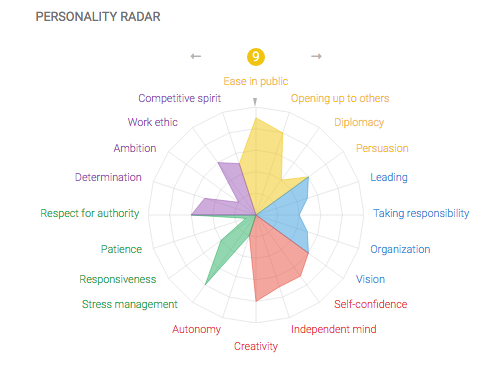
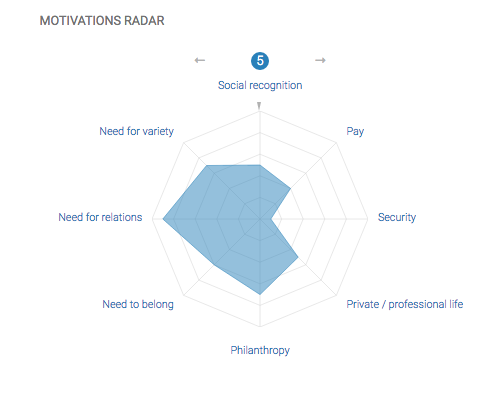
Talentoday further identifies her as a great start-up candidate with these insights:
Creativity 8 / 10: She likes to be innovative and find original solutions. She is not very conventional.
Stress Management 8 / 10: She finds it easy to keep her cool in stressful situations. She performs well under pressure.
Motivations — Security 1 / 10: She does not need security in her work; she likes to take risks.
Motivation — Need for Relations 9 / 10: She is motivated by teamwork and relations with others are very important.
The most important asset a start-up has is its people. When reviewing your candidates, identifying their personality traits is even more important than evaluating their skills. With the right personality traits, an employee can gain experience and move up the ladder, developing into exactly the long-term employee you need.
Curious to find out your professional traits? Check out our page to take your free personality assessment today. And if you like this post, please hit the ❤️ button below or give me a shout on Twitter.
Psychometrics: unleash your superhuman talents

Psychometrics. Sounds like something out of a lab experiment, right? Someone in a hospital gown hooked up to wires that monitor brain waves?
No, it’s not a scene from Stranger Things. It’s cutting-edge technology that when mixed with a powerful algorithm, is changing the game in human resources, online advertising and customer experience.
By definition, psychometrics is the science of measuring mental capacities and processes. Algorithms and predictive analytics are used everywhere from Facebook to Amazon measuring behavior as an indicator of content preferences and buying habits. But now we are seeing this technology used in a brand new way.
Talentoday’s personality questionnaire and underlying algorithm leverage psychology and data science to discover someone’s unique personality traits and motivations. What makes this test unique? Talentoday was born out of in depth research done by top psychologists and will not place you into a Myers Briggs box — it is the only one of its kind in HR.
Talentoday for Hiring Managers & Recruiters:
The real psychometric magic happens when the behind the scenes computing is combined with a simple (& free) online questionnaire that was designed with busy professionals, like you, in mind. It can be accessed on any device, includes short and easy to comprehend questions, and takes an average of 11 minutes to finish.
While the questionnaire goes in depth, you do not need a Ph.D to understand the results. Assessment information is presented in an easy to read format, allowing hiring managers to make data-driven decisions about potential employees rather than relying solely on gut instincts developed during interviews.
To get even more out of the reports, Talentoday offers a certification program that will show you how to review results at a deeper level. One member of a hiring team or HR office can become an expert and share their knowledge with the rest of the team.
With a deeper understanding of a candidate’s personality, companies can more accurately know how a candidate will fit the job description and office culture, which will lead to a higher rate of a successful hire and increased employee retention long term.
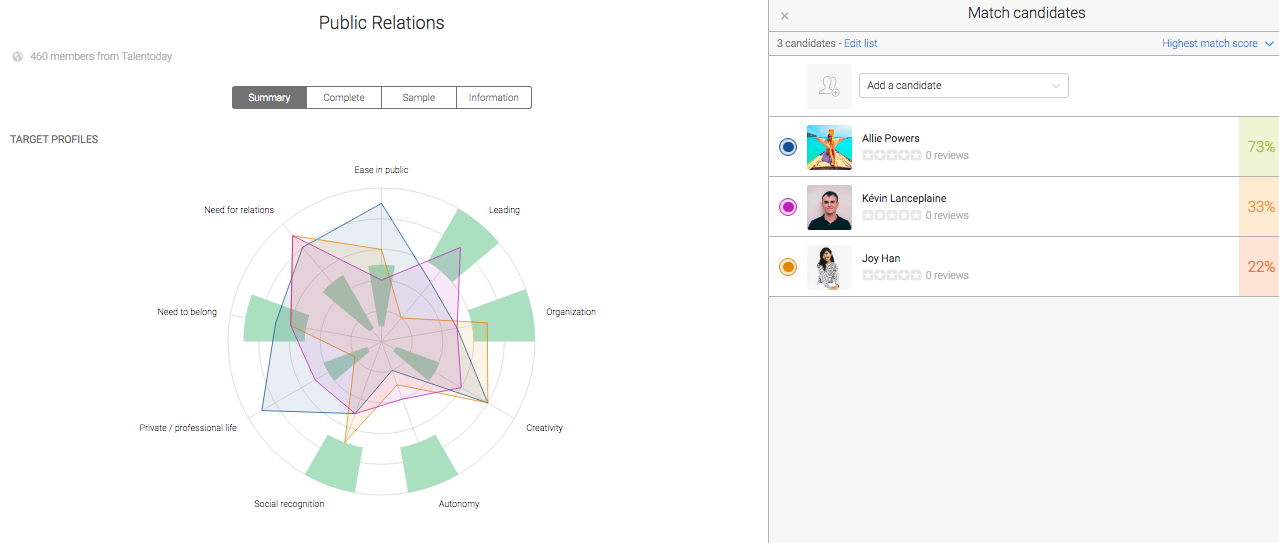
HR offices and staffing agencies can also use the target profiles created from Talentoday’s growing database to match their incoming candidates to. The job matching system (above) shows managers if the candidates meet the essential criteria — reducing the risk of hiring a bad fit and saving time in the process.
The whole thing is built to scale, and can be customized to fit any organization’s needs.
Talentoday for the average joe
On the other side of the house, candidates now have full access to their superpowers. Score a 9 in creativity? Time to play up your best qualities in your next interview and land the job you have been eyeing the first time around. The company also offers career recommendations in a comprehensive PDF report and includes interview questions to help you prepare.
Want to learn more? Try the free personality assessment for yourself. You’ve got nothing to lose and only insight and data to gain. Unleash those super powers folks!
Curious to hear more HR & Recruiting tips? Check out additional articles. And if you like this post, please hit the ❤️ button below or give me a shout on Twitter.
Hit a Hiring Road Block?
3 Powerful Tools for Recruiting the New Generation
This is the era of the Millennials, a generation that, according to the United States Census Bureau, represents more than one quarter of the United States population and is the largest population in the United States today. Take Google’s headquarters, for example. When you walk onto the campus the first thing you see are young adults bustling between the buildings. It looks almost like a busy college campus.
As more of today’s students graduate and enter the job market, recruiters must learn how to attract them and HR teams want to be sure their new recruits will stay motivated when joining their company’s workforce. If companies want to compete with the Googleplex, they need to make their hiring process more effective and their job offerings more alluring to new hot candidates. The challenge is creating a process that is enticing to the interviewee and informative to the company while still remaining bias free. Hiring a millennial will look much different than hiring from previous generations but luckily there a few nimble start-ups dedicated to making this process a success.
Three Powerhouse Recruitment Tools
While it is the era of Millenials, it is also the era of new tech tools. As the candidate pool has evolved so has the technology. HR teams have adapted the following hiring solutions to their recruitment process to help them make more informed decisions.
- Greenhouse companies like AirBnb, Pinterest & Vimeo have successfully implemented this new software that optimizes the entire recruiting process. With Greenhouse, you can find better candidates, conduct more focused interviews, and organize the recruiting process from start to finish. Experienced interviewers don’t wing it. The interview process should be a powerful marketing tool. You want every candidate to walk out of their interview feeling impressed by your team and excited about your company. Greenhouse provides all the tools you need for powerful, structured interviewing.
- Talentoday is a HR portal where people seeking jobs can take a simple & informative questionnaire that analyzes people’s personality and motivation at work The psychometric technology leverages Talentoday’s growing 3.5 million global database of detailed personality assessments. The companies secret weapon is their job matching platform which allows you to match candidates to Job Profiles in the industry to quickly see if you have a good fit. It has a slick, modern interface and is integrated with social networks such as Facebook, LinkedIn, and Twitter, making it very appealing to this new generation.
- Interviewing.io on the other side of the house is this quickly growing company that allows engineers to skip the bullsh** and get right to the technical stuff. Hiring engineers? You can now talk directly to engineers who’ve been killing it in technical interviews. With their unique approach candidates who do well in practice, get invites to interview anonymously with great companies. That means Millennials can skip right to the technical screen without talking to recruiters, touching their resume, or worrying about bias. If you have the skills you get the job, it is as simple as that.
With these tools, a the recruitment team will be one step ahead for their candidates, providing them job opportunities that better fulfill their needs and life goals, while saving the company precious time with a more effective recruitment process.
Embracing These Modern, Powerful HR Recruitment Software
The population of job applicants is continuously changing and a new generation is entering the workforce with very different expectations and attitudes. HR teams will become better at understanding this evolution and select candidates that better fit their company, or lose top candidates to other companies who are catching on.
“Digitization, social networks, big data, and machine learning are disrupting the staffing and recruitment industry and the future of professionals hinges on the ability to understand, interpret and embrace data” — Alberding Group
Adapting new tools that combine recruitment planning, people analytics, machine learning and the latest advancements in psychology will allow companies to attract new generations of job applicants who will remain productive and committed to their job.
Curious to hear more HR & Recruiting tips? Check out additional articles. And if you like this post, please hit the ❤️ button below or give me a shout on Twitter.
How to hire a super star sales professional.
3 unique traits in those who close deals
A great product or service can easily go unnoticed if it does not have the right people to sell it. As a hiring manager, how can you find sales stars that shine? With thousands of sales professionals in our data base, we have created a profile on what makes an individual a great deal closer — & it is not what you may think. According to our data, top sales performers display the following traits:
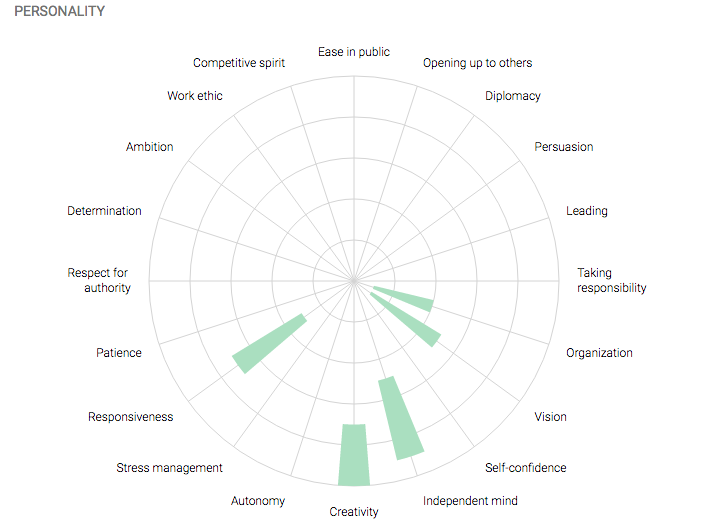
#1 Creative: Lives (and thinks) outside the box
There are many ways to sell a product or service, and the same approach is not right for everyone. Creativity is often required to take a customer from “maybe” to “yes” and close a deal.
A successful salesperson thrives in an environment where they need to constantly adapt to changing goals and creatively solve problems on a daily basis. You don’t want someone who sometimes thinks outside the box, you want someone who doesn’t know that the box even exists.
#2 Responsive: Intuition based decision making
Have you ever felt like the car salesman down the street read your mind? Well, they did. Salesmen/women rely so heavily on their intuition that they can easily get in their customers head and are usually two steps ahead. Genuine sales professionals are quick on their feet, and favor spontaneous action over reflection.
But while they are quick they are also swift and can adapt to a new situation at the drop of a hat. Their chameleon like nature allows them to respond to the personalities of a rainbow of potential customers.
Team members who have mastered the art of clear and consistent communication with their clients will lead your company to higher customer satisfaction, and a better bottom line as a result.
#3 Independent mind: Supervision not required
A rockstar salesperson should be able to take a goal and run with it. That means setting their own schedule and ensuring that all relevant goals are met on time.
Self motivation is crucial, especially in environments where sales reps work remotely or travel frequently. Managers should be able to support their teams without getting in the weeds on day-to-day details.
The total superstar sales package
The key to making a sale is understanding customers’ needs and figuring out how your product or service can meet them — the intersection of creativity, responsiveness, and independence. Find someone who has all three and you are well on your way to success.
While every employee is unique, these insights may help you determine which applications rise to the top of the pile. For help hiring your next sales professional use this job matching system to see how your candidates stack up against your current sales team. Stop relying on your gut instinct for hiring (leave that to sales) and start making data-driven decisions.
Want to read more recruiting tips and tricks? Check out my blog page.
The future of recruiting: how to save time, money & stress.
How to Save Time and Money in the Hiring Process.
On paper, the candidate seemed great. But as you stare across the conference table at his disinterested, glazed expression, you wish you had a Doctor Evil button to press so you could watch his chair get swallowed by the floor. You’re a professional, though, so you finish your interview and politely escort him out after a wasted hour. What went wrong? He seemed amazing from his resume!
The average recruiter spends nearly 40 hours and over $1,000 to hire someone (1). And hiring the wrong person can cost a company more than $50,000 in lost productivity(2)! Companies don’t just have to handle replacement and re-training costs of the employee that didn’t work out, but a mismatched employee will affect the entire team’s morale as they scramble to get that person’s work done. In 2012, 22% of recruiters reported that the reason for their bad hires was because of “insufficient talent intelligence.” Issues and personality traits came out after hiring that the recruiter didn’t expect. Recruiters in today’s fast paced quota-filling atmosphere have a limited amount of time to get to know candidates extremely well. Efficiency is critical.
So how can recruiters speed up the process and hire the right talent the first time? Using psychology-based testing prior to interviews can give recruiters important insight into a candidate’s personality. Most of us at one time or another have taken the old-school, popular “Myers-Briggs” test and gotten the four-letter acronym that “matches” us (a.k.a. tries to fit us into convenient little boxes) — any other ENFJ’s out there? But that test was researched and developed in the 1940’s!
Today, recruiters need to understand what drives today’s workforce, and more importantly what motivates them at work. Instead of being placed in a generic box, recruiters should be able to match candidate’s traits and motivators with the team and the company’s unique culture to see if they will make a good fit.
Using a modern psychology-based tool like Talentoday Manager, that was developed with the traits of today’s workforce and the uniqueness of your company in mind, means you have personalized insights by professional psychologists! Really knowing who your candidate is, what motivates him or her, and how he or she will fit on a team, in a role and at your company — before they even come in to interview — will save countless hours and dollars interviewing, negotiating, and potentially re-hiring
And you won’t need your Doctor Evil button after all.
Want to read more recruiting tips and tricks? Check out my blog page.
Sources:
- GetHired.com as reported on http://theundercoverrecruiter.com/wp-content/uploads/2012/06/how-much-hire-graphic.jpg
- http://www.careerbuilder.com/share/aboutus/pressreleasesdetail.aspx?sd=12/13/2012&id=pr730&ed=12/31/2012
Are you in the wrong job?
How using your personality strengths leads to job satisfaction.
You have a job, but is it really the job you want?
Sure, you may get along with your coworkers and feel fulfilled by your work at least some of the time, but you still can’t resist checking out job posting sites or asking around about potential openings at happy hour.
You are not alone. It’s easier than ever to apply for jobs, network with companies and recruiters, and work from the comfort of home or your local coffee shop — meaning that workers are changing jobs more often than ever.
According to the Society of Human Resource Management, about one-third of new hires quit their jobs after six months, and CareerBuilder reports that 32 percent of employers expect their employees to job hop.
Some who leave jobs find that the grass isn’t always greener on the other side, beginning another cycle of job searching. However, a new wave of data-driven hiring is making it easier for companies and employees to find long-term matches.
If the employee’s personality fits with the company, chances are the employee will stay longer. And, companies are using personality data to understand the roots of human behavior and how to shape their businesses accordingly — a strategy known as people analytics.
They know your buying habits and can compare them to similar consumers to suggest new products for you, predict future behavior, or improve customer service. Entrepreneur reports that the Container Store is doing just that by using wearable technology to track employee interactions with customers on the sales floor.
People analytics applies to hiring, too. Search committees and sorting through endless stacks of resumes to arbitrarily pick a candidate may soon become a thing of the past in favor of data-driven placements that match a candidate’s personality with the open position and company’s culture.
There are many options out there when it comes to online personality assessments, but not all are created equally. Talentoday’s personality test was specifically designed for a professional setting. The questions are no longer than a Tweet and each has only two possible answers. They fly by and the entire thing can be completed in just a few minutes.
Are you a leader or a follower? Are you open to new assignments and challenges? How comfortable are you speaking in public and interacting with others you don’t know? The psychometric test gives you answers to those questions and uses a scientific algorithm to provide you with the career advice you have been yearning for.
The answers from your personality test can be shared on social media or with recruiters who can place you into jobs that fit your skill set and puts you on the path toward a long-term career in that field — minimizing the potential that you’ll be job hunting again in six months or a year.
Before you hit the job board next time, consider taking a personality test to find a long-term career that motivates you and uses your strongest traits to your advantage.


